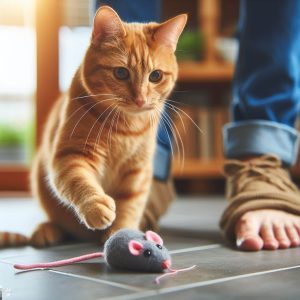As a responsible pet owner, having your female cat spayed is one of the most important things you can do for her health and wellbeing. However, it’s normal to be concerned when kitty isn’t quite herself in the days following the surgery.
Lethargy and low energy are common side effects as your cat recovers from anesthesia and the surgical procedure. But how long should it last, and how can you tell normal postoperative fatigue from a potential medical issue needing veterinary attention?
This in-depth guide covers everything you need to monitor your cat’s recovery after spaying and know when to call the vet.
Understanding Spay Surgery Recovery What to Expect
Before going into the specific signs of abnormal lethargy, let’s look at the expected timeline for recovery from a routine spay surgery.
What Happens During the Procedure
Spaying, medically known as an “ovariohysterectomy,” involves fully removing the female cat’s reproductive organs.
The veterinarian makes an incision through the abdomen to access and detach the uterus and ovaries. The ovaries are completely extracted, and the uterus is ligated and removed.
All incisions are then closed with dissolvable sutures or skin staples/glue. The entire surgery typically lasts 30 minutes to 1 hour.
Initial 24 Hours: Out of It from Anesthesia
Your cat will remain at the vet clinic for initial recovery on the day of surgery. She’ll be very sleepy, unsteady, and likely nauseous immediately after the procedure.
This is normal and expected due to the effects of general anesthesia medications, which can linger for up to 24 hours.
During this initial period, it’s common to see:
- Lethargy, weakness, and uncoordination from anesthesia
- Nausea and lack of appetite – don’t force food yet
- General discomfort and glassy-eyed appearance
- Slow, slightly unsteady gait if she moves around
Your cat may vomit bile or foam due to nausea from the anesthesia. The vet will provide injectable anti-nausea medication as needed.
Once your cat is stable enough to go home later the same day, she’ll need a calm, supervised place to continue recovering. Limit food at first to small amounts of water or broth.
Days 1-3 After Surgery: Improving Energy
In the first 1-3 days at home after spaying surgery, your cat should start improving but will still need significant rest. Appetite often remains decreased during this stage.
You can expect kitty to be much less active than usual, moving slower, and sleeping more. But by the second or third day, she should start voluntarily getting up, walking to her litter box, eating small amounts, and showing some interest in her surroundings.
- Energy level remains lower but is improving over time
- Moving slower but not unable/unwilling to walk
- Responds to their name, treats, catnip but tires quickly
- Sleeping often but interacts when prompted
Make sure to follow your vet’s post-op instructions for checking the incision, preventing licking, giving any prescribed medications, and monitoring appetite. Watch closely for concerning symptoms, but know that some lingering sleepiness and low appetite are expected.
Days 4-14 After Surgery: Back to Normal
Within 5-7 days after the spay procedure, your cat should seem much more alert, active, and back to her old self.
Her appetite should return fully, energy levels back to normal, and interest in toys/play/treats resumed. By the second week post-op, the incision should be healed externally and all sutures can be removed.
If lethargy, weakness, or appetite issues persist past day 5-7, contact your veterinarian for assessment, as prolonged recovery may indicate complications.
Signs of Abnormal Lethargy After Spay Surgery
As you monitor your cat’s recovery during the first 2 weeks post-op, watch for these signs of excessive or abnormal lethargy requiring veterinary attention:
Excessive Grogginess and Unsteadiness
- Still very wobbly and uncoordinated several days after surgery
- Unable or unwilling to walk unassisted across a room
- Not responsive to stimuli like noise, treats, catnip
- Little to no voluntary movement or activity
Lack of Improvement Over Time
- Energy level and alertness not increasing by day 3
- Still abnormally sleepy and quiet by day 4-5
- Completely disinterested in toy play by end of first week
Cannot Eat, Drink, Use Litter Box
- No interest in food or water beyond 2-3 days post-op
- Not getting up to use litter box; accidents in bed
- Does not pass urine or stool for over 24 hours
Pain and Discomfort
- Crying out, whimpering, growling when touched
- Aggressive behavior when approached
- Reluctant to move head and neck
- Restless, unable to get comfortable
If your cat shows any of the above symptoms or behaviors beyond 3 days post-spay, contact your veterinarian right away for an urgent assessment. Prolonged or excessive lethargy can indicate a serious medical issue requiring treatment.
What Causes Ongoing Lethargy After a Spay Surgery?
There are several potential medical reasons why your cat’s energy level and activity are not back to normal within 3-5 days after being spayed.
Surgical Wound Issues
- Infection – if bacteria enter the incision, it can become red, swollen, oozing, and infected. Kitties with infected incisions are often lethargic.
- Seroma – fluid builds up under the incision, causing swelling. Large seromas can be painful and make moving around difficult.
- Dehiscence – the surgical wound reopens, usually due to licking or infection. This is extremely painful and requires prompt veterinary attention.
Internal Complications
- Bleeding – small amounts of internal bleeding can sometimes occur after surgery, leading to anemia, fatigue and collapse.
- Abscesses – pocket of pus inside abdomen, often from infected surgical stitches. Causes severe illness if not treated promptly.
- Peritonitis – inflammation of the abdominal lining, usually from a perforated organ or infected abdomen. Results in life-threatening illness.
Issues Tolerating Anesthesia
- Prolonged drug effects – if your cat has kidney/liver impairment, anesthesia medication can take longer to metabolize, causing persistent drowsiness.
- Abnormal drug reactions – some cats can be sensitive to certain anesthesia drugs, resulting in appetite loss, vomiting, and lethargy lasting several days.
- Hypothermia – anesthesia can disrupt body temperature regulation. Kitties may act very sluggish as they try to rewarm post-op.
Excess Surgical Pain
- Discomfort – spay surgery causes moderate pain afterwards, for which kitties are prescribed pain relievers. If your cat is still in significant pain despite medication, prolonged lethargy can result as she tries to limit movement to avoid additional pain. Consult your vet about stronger analgesic options.
- Stitches too tight – in some cases, overly tight sutures or skin glue can make incisions painful. This may resolve on its own as the incision heals, but pain medication can provide relief in the meantime.
No matter what the underlying cause, abnormal lethargy more than 3 days after spay surgery warrants a prompt call to your veterinarian for examination and treatment. Don’t assume kitty just needs more time – prolonged recovery can be a red flag for a serious issue.
At-Home Care Tips for Post-Spay Recovery
While your cat recovers from spaying, you can help speed healing and prevent complications by following these tips:
Limit Activity
Restrict jumping, running, and stair climbing which could pull internal stitches. Confine your cat to one room without dangerous hiding spots like under beds. Provide steps to furniture if needed. Walk your cat on a leash for bathroom trips.
Check the Incision Site
Examine the surgery site once or twice daily. Look for excessive redness, swelling, discharge, opening, or bleeding. Contact the vet immediately about any abnormal incision findings.
Discourage Licking
Wearing an E-collar prevents licking and chewing of stitches. If an e-collar isn’t tolerable for your cat, monitor closely and distract with toys any time licking occurs. Excessive licking can lead to infection.
Support Comfort
Make soft, warm bedding available in low-traffic areas. Feed your cat’s prescribed pain medication as directed. Offer tempting foods like canned kitten food, meat baby food, or warmed broth to entice eating.
Reduce Stress
Keep the environment calm and quiet. Restrict visitors and keep other household pets separated initially. Limit handling and stimulation until your cat seems more energetic. Excess stress can delay healing.
Monitor Litter Box Habits
Signs like straining, vocalizing, or skipping the litter box can indicate discomfort. Scoop the box more frequently while your cat’s mobility is limited. Contact the vet about any pottying issues post-op.
Allow Rest
Resist the urge to constantly check on or stimulate your recovering cat. Sleep and rest are essential following surgery and anesthesia. Make sure food, water, litter, and bedding are easily accessible, then allow your cat uninterrupted rest.
Attend Post-Op Rechecks
Get all recommended recheck exams with your veterinarian. Incision checks help monitor healing progress. Timely suture removal or glue peel-off is also needed. Discuss any concerns with your vet during these visits.
By keeping your cat comfortable and properly limiting activity in the days following the spay procedure, you can help minimize the fatigue and lethargy expected during recovery. But do watch closely for any warning signs requiring urgent veterinary care.
When to Take Your Cat to the Vet After a Spay Surgery
Besides prolonged lethargy, contact your vet promptly if you notice any of the following signs:
- Obvious pain or crying out when touched
- Swelling, discharge or opening of the incision
- Bleeding from the incision or vulva
- Difficulty urinating or defecating
- No urine production over 24 hours
- Heavy vomiting or diarrhea
- Loss of appetite beyond 2-3 days
- Weakness, collapse or inability to stand
- Pale gums or rapid breathing
Do not wait to see if symptoms improve on their own. Catching post-op issues early is crucial. Even if you’re unsure, it’s better to call and have your cat examined. Your vet can assess, run tests if needed, and provide appropriate treatment.
What to Ask Your Vet About the Spay Recovery Process
To ensure you know what to expect as your cat recovers from her spay surgery, ask your vet:
- How long until my cat’s energy level and appetite should return to normal?
- What symptoms are normal post-op, versus signs I should call about urgently?
- Will you send home any medications for pain, nausea, antibiotics?
- How should I monitor the incision site as it heals?
- When will my cat be cleared for bathing, playtime, regular activity?
- Do you recommend an e-collar to prevent licking the incision?
- What restrictions on food, water, litter box use are needed initially?
- How soon should I schedule an incision check recheck appointment?
- Under what circumstances should I bring my cat in immediately?
FAQs About Lethargy After Spaying Surgery
How long will my cat be lethargic after being spayed?
It’s normal for your cat to be sleepy and low-energy for the first 24-72 hours following a spay surgery. By days 3-5, your cat should be back to near-normal energy levels. Call your vet if significant lethargy persists beyond this timeframe.
What helps a cat recover faster after spaying?
Restricting activity, keeping the environment calm, providing soft bedding, tempting your cat to eat nutritious foods, and administering all medications as directed can help support the fastest possible recovery after a spay procedure.
When can my cat go outside after being spayed?
Veterinarians typically recommend waiting 10-14 days after a spay surgery before allowing your cat to go outdoors. This ensures the incision is fully healed and minimizes risks of it reopening, becoming infected, or absorbing toxins from litterbox exposure.
When can my cat take a bath after spaying?
Avoid bathing your cat for at least 2 weeks after a spay surgery, until the incision is completely healed. Bathing sooner could irritate the surgery site, cause sutures to dissolve too quickly, or allow infection to develop.
How can I get my cat to eat after spay surgery?
Offer enticing “recovery foods” like warmed kitten formula, meat baby food, or canned fish to stimulate appetite after spaying. If your cat hasn’t eaten for more than 2-3 days post-op, call your vet asappetite stimulants or other assistance may be needed.
The Takeaway: Monitor Closely and Contact Your Vet With Any Concerns
It’s extremely common for your female cat to be tired, inactive, and sleepy after being spayed. Allow her several days’ rest to recover. But if you notice any signs of abnormal or prolonged lethargy, incision issues, appetite problems, or discomfort, don’t hesitate to call your veterinarian right away for prompt examination and treatment. Close monitoring after spaying, along with follow-up veterinary care if needed, ensures your cat returns to her normal, healthy, energetic self quickly.



